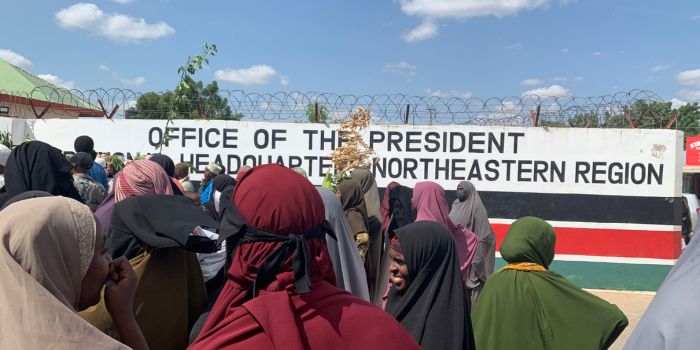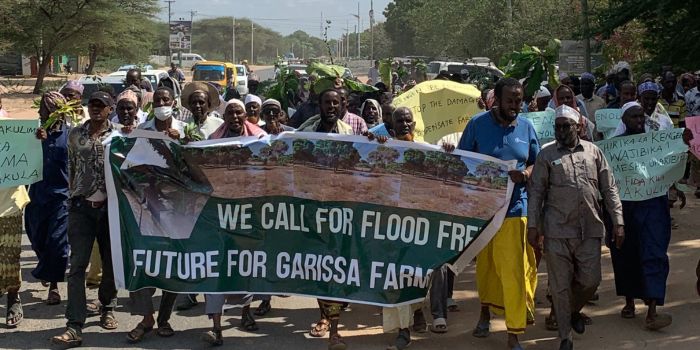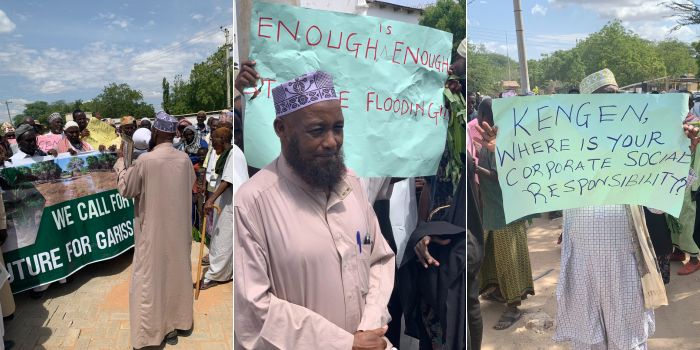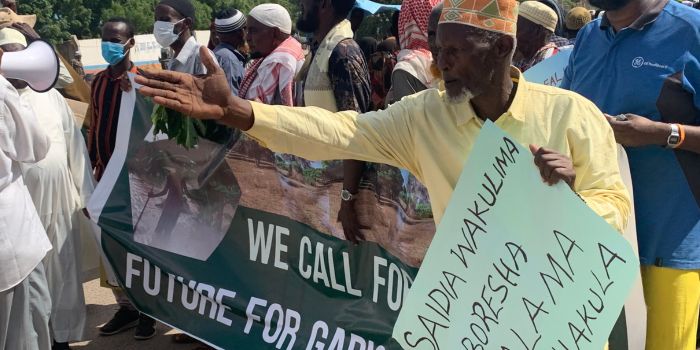Flood-affected Garissa farmers hold protest in demand for government help

Waving placards and twigs and chanting "No farmers, no food, no life," they marched to these offices to present grievances about losses suffered following heavy rain and floods and to complain about a lack of support.
Hundreds of Garissa County farmers took to the streets on Monday in a demand for support from the national and county governments.
Led by officials of the Garissa Farmers Network Association, the farmers assembled at the Garissa Primary School playground before a peaceful procession to the offices of the Garissa County Commissioner, the North Eastern Regional Commissioner, and the governor.
More To Read
- Garissa town residents call for urgent drainage fix as floodwaters swamp businesses, homes
- Garissa Governor Nathif Jama sounds alarm over Dadaab crisis at IGAD conference
- Ex-Garissa Governor Ali Korane joins UDA, secures clan backing for 2027 gubernatorial race
- Quba Mosque reopens after Garissa Governor Nathif Jama, SUPKEM broker peace
- Garissa Governor Nathif Jama grilled by EACC over alleged Sh1.2 billion graft allegations
- Garissa farmers to benefit from Sh45 million irrigation project aimed at boosting food security
Waving placards and twigs and chanting "No farmers, no food, no life," they marched to these offices to present grievances about losses suffered following heavy rain and floods and to complain about a lack of support.
 Garissa farmers, under the Garissa Farmers Network Association, demonstrate in Garissa town on June 10, 2024, in a demand for government intervention following heavy rains and heavy losses. (Photo: Issa Hussein/EV)
Garissa farmers, under the Garissa Farmers Network Association, demonstrate in Garissa town on June 10, 2024, in a demand for government intervention following heavy rains and heavy losses. (Photo: Issa Hussein/EV)
In a memorandum they presented to the officials, the farmers demanded flood control measures, afforestation initiatives, compensation, material and financial support, and investment in the agriculture sector.
Other demands included the creation of an independent farmers market, a regulatory policy to monitor produce from other counties, the establishment of a local warning system for disasters, and prior resource mobilisation ahead of floods.
Network chair Abdi Farah said the farmers were counting losses of approximately sh2.3 billion due to the massive destruction caused by the successive El Nino and the March-May rains.
Abdi said they were "knocked down to a level that rendered it impossible to rebuild their livelihood without the support of the national and county governments."
"We need start-up capital, seeds, farm implements, and the restoration of destroyed canals and road infrastructure," he said.
 Garissa farmers, under the Garissa Farmers Network Association, demonstrate in Garissa town on June 10, 2024, in a demand for government intervention following heavy rains and heavy losses. (Photo: Issa Hussein/EV)
Garissa farmers, under the Garissa Farmers Network Association, demonstrate in Garissa town on June 10, 2024, in a demand for government intervention following heavy rains and heavy losses. (Photo: Issa Hussein/EV)
On flood control, he urged the government to come up with plans to either increase the holding capacity of dams or construct some in Garissa to reduce the impact of floods.
He also called upon the Department of Environment and Natural Resources to craft a river bank protection plan to help mitigate the impacts of the floods.
Network vice chair Abdullah Abdi noted that the national and county governments needed to help farmers rebuild their livelihoods.
"We rely on farming, yet for the last eight months, we have not had any harvests after massively investing in our farms. Successive floods destroyed our farms; expensive farm implements were swept away, yet no help has come from the two levels of government," Abdullah said.
He said that now that the floodwaters have receded, the farmers urgently need seeds and seedlings, the provision of farm machinery and implements, and the rehabilitation of infrastructure.
 Garissa farmers, under the Garissa Farmers Network Association, wave placards and twigs during a demonstration in Garissa town on June 10, 2024, in a demand for government intervention following heavy rains and heavy losses. (Photo: Issa Hussein/EV)
Garissa farmers, under the Garissa Farmers Network Association, wave placards and twigs during a demonstration in Garissa town on June 10, 2024, in a demand for government intervention following heavy rains and heavy losses. (Photo: Issa Hussein/EV)
Farmer Hussein Said Warsame urged elected leaders to take responsibility and stand with farmers in their time of need.
Isnino Olat of the Wadajir Farm said he lost 30 lemon and 20 mango trees, as well as banana and vegetable crops that were ready for harvest.
"Do you know how long it takes for these mango and lemon trees to grow and how much we invested? We have suffered big losses [sic]," he said.
 Garissa farmers, under the Garissa Farmers Network Association, demonstrate in Garissa town on June 10, 2024, in a demand for government intervention following heavy rains and heavy losses. (Photo: Issa Hussein/EV)
Garissa farmers, under the Garissa Farmers Network Association, demonstrate in Garissa town on June 10, 2024, in a demand for government intervention following heavy rains and heavy losses. (Photo: Issa Hussein/EV)
Garissa County Commissioner Mohamed Mwabodza, who was in Nairobi for work, acknowledged that the memorandum was presented to his office and promised to follow up.
The Garissa Farmers Network reported that it had secured an appointment with Garissa Governor Nathif Jama, who was not in his office.
Deputy President Rigathi Gachagua, who visited Garissa town last month to assess the impact of the floods, promised the farmers that KeNGen would compensate them by providing new water pump engines for irrigation.
Top Stories Today














































